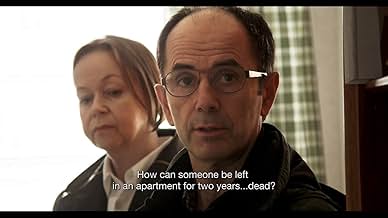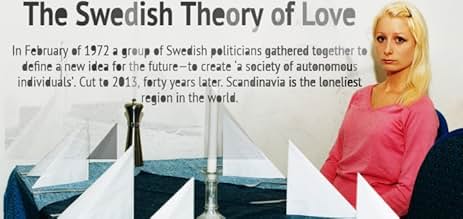The Swedish Theory of Love
- 2015
- 1 h 30 min
Adicionar um enredo no seu idiomaInternationally Sweden is seen as a perfect society, a role model and a symbol of the highest achievements of human progress. The Swedish Theory of Love digs into the true nature of Swedish ... Ler tudoInternationally Sweden is seen as a perfect society, a role model and a symbol of the highest achievements of human progress. The Swedish Theory of Love digs into the true nature of Swedish life style, explores the existential black holes of a society that has created the most au... Ler tudoInternationally Sweden is seen as a perfect society, a role model and a symbol of the highest achievements of human progress. The Swedish Theory of Love digs into the true nature of Swedish life style, explores the existential black holes of a society that has created the most autonomous people in the world.
- Prêmios
- 5 indicações no total
- Narrator
- (narração)
Avaliações em destaque
It makes a trip to (I believe) Ethiopia to show the so-called opposite of Western countries, telling how people there take care of each other. But again, it does nothing more than point out the fact. It even just tells it, in voice over, or 'talking head'. I would love to be shown exactly, and deeply, how these things work, and how they are so different from what happens in Sweden. Don't just film a bunch of strangers carrying a friend to a hospital with a voice over doing the rest of the work.
It shows countless people alone in Sweden; on escalators, running through a forest, in the subway, etc. To me, it seemed to do all this without any clear idea of what it was trying to say. This is a movie not first about people, but about a subject, a subject having been chosen beforehand. That is what, to me, gives it its feel of being very general, and gratuitousness, about nothing and no-one in particular.
While this may be a matter of taste, I like to see it the other way around; you make a movie about someone, and it automatically will be about a subject too. The movie makes trips around Sweden and around the world that are gratuitous to the extent of annoyance: we see guys masturbating in a sperm-bank and we actually see sperm cells (somehow needed to tell something about family planning of single mothers that want to remain single), and that is supposed to be funny. But somehow, here it seemed to be out of place. I did not long for a comic or absurd note at all. We get a full blown view on the tumor in a girl's tongue in Ethiopia. Why? What did that contribute to anything? Most annoying of all was the part where this Swedish surgeon based in Ethiopia shows with what kinds of things he manages to operate (household stuff, wheel spokes). This got the audience laughing like hell, and in another context it would have gotten me too – but here it did not attribute anything to the investigation on loneliness whatsoever. I guess it had something to do with perfect organization in Sweden at the cost of having to improvise or something, but to my mind the movie did not do a great job of showing how that is shocking, dramatic, sad, or even interesting. It was a vague suggestion to the difference in lifestyles, and somehow this was related to loneliness too.
Also: once again I was reminded of the fact that arty documentaries can in fact use the same dramatic instruments as Hollywood movies: when it's sad, you hear sad music. When its threatening, you hear sound of threat.
I was about to stand up and leave, when darling and hero Zygmunt Bauman entered the stage. I listened to him respectfully and that was that.
Btw: I really liked Videocracy, so this was a big disappointment. Please come back and make a story about a particular someone, or someplace, and stick with it for 90 minutes. Try and take a closer at a subject instead of quickly flying over a landscape of generalities and anecdotes, of which it is unclear what they contribute precisely, and could have been a full blown docu all by themselves. The depth it will bring you will pay you back, I promise. And: there is no faster way to kill a story than to know what it is about beforehand (one of the Pixar rules of storytelling;-) ). That way it will never surprise you, because it will be caged from the beginning.
I can understand why this wouldn't be interested to a.) someone who doesn't live in Sweden or b.) a Swede who was raised here and sees it as business as usual.
But since I have wondered about all this for some time, it was elucidating.
I don't agree with the contrast between Sweden and Ethiopia, however. In the film, Ethiopia is described to be poor in wealth but rich in community, while Sweden is financially wealthy yet socially barren. Societies in such countries as Ethiopia have complex social systems which are restricting in their own ways and should not be romanticized as utopian.
The masturbation scene will sadly not allow me to show this to my parents, since they are old and prudish. Just a fair warning if you want to show this to your old and prudish parents too.
Watching this documentary gave me a few nice insights. The quest in the west to gain as much freedom as possible has gone too far. We gain the freedom by distancing ourselves from other people. We can do this because we are less and less dependent on relatives and our local community. With the wealth we got in the West we can buy the things we need. For example, old people no longer depend on their children, but on professional services (which we pay for).
People also tend to take the easiest and most comfortable way of doing things. It's way more comfortable to be with yourself and don't be bothered by others (This is something that hits close to home). With others you'll get criticism, change of rejection and you'll get discussions. It's also more comfortable to have shallow relationships on social media than to expose yourself to somebody in real life.
Some reviewers talk about the lack of information in this documentary. You will get some facts and statistics, but this documentary also creates a kind of feeling with the images you ll see. For example, it's hard to talk about loneliness. But the documentary is doing a good job of get a feeling of loneliness.
Another reviewer didn't get the point of the sperm-bank and the Swedish surgeon based in Ethiopia. The voice over will make some links, but sometimes you have make the links yourself. The sperm-bank was used to create a feeling: the sadness of it all. Instead of working hard for a relationship where you get to the point of trying to make a baby together, a man is masturbating alone in a white room and a girl is inseminating herself, also alone. Much more efficient, safe, secure etc. etc., but also boring and without the personal connection between two people.
The scenes of the surgeon in Ethiopia I find a bit too shocking myself. The scenes give you the feeling of the community who helps the ones in need. Instead of an anonymous ambulance who drives someone to the hospital, relatives, friends and/or neighbours lift the wounded person to the hospital. The ambulance is much more efficient and save, but the old fashion way brings a lot more bonding between people. The scene where the surgeon talks about the household stuff he used to operate, shows us the creativity that is needed to survive. And because in the west everything is so bureaucratic and written down in procedures, it's a lot more boring. To feel alive we need to be able to be creative in our lives. Not only in our free time, but also in our work. Healthcare is much better in the West but it comes with a price. Just like all the freedom and wealth we have.
My issues with the one-sided nature of this documentary, stems from the lack of representation of the whole picture. Almost every scene seemed to be set up to visually invoke a sense of loneliness. Instead of portraying hipsters, inseminations and a single perspective from a doctor in Ethiophia, Gandini could've showed the positive side of life in Sweden, and more importantly explore possible solutions to emergent isolation in many urban socities.
Other problems with delayed discovery of deceased and the bureaucracy in the health sector, are systematic errors and I fail to see the basis of correlation to a solitary life.
A last note on the review by scissorbits ("Interesting for an immigrant in Sweden, explains a lot"), it was certainly intriguing to acquire a new frame of reference. And it touches on the current, and perhaps more acute, issue with integration. Sweden isn't socially barren, but it is a heavy challenge to make friends with the citizens, in this land of constricted groups of vikings.
Having said this, I find it quite intriguing that some reviewers have issues with this documentary's depth and (lack of) opinion. Why a documentary should have this eludes me. Wikipedia has a rather simple description of a documentary: "a nonfictional motion picture intended to document some aspect of reality, primarily for the purposes of instruction, education, or maintaining a historical record".
That is what this documentary does do, without an enormous pain of an opinion. To me it tells a story about a highly sophisticated society which has issues most people don't know about and most Swedes don't care much about. Maybe it's just me - that I didn't know this yet - but I thought it quite educational. I live in a country that also prides itself for it's high level of individualism (Holland), but I think the Swedes gave that a whole new dimension, with a downside called isolation. One idea that particularly stuck with me is that (a high level of) certainty leads to boredom. The apparent emptiness in many shots showed this rather subtly and in general I thought the music nicely added to some of the statements made.
All in all, it may not be the best documentary made, but it is a peek into the real Sweden, which mostly gets overlooked. As another reviewer said, I think it would be wise to first watch this movie before deciding to move to the promised land, called Sweden.
Você sabia?
- Citações
Self - professor: The Swedish theory of love. What does it say? It says that all the authentic human relationships, right, have to be based on the fundamental *in*dependence between people. A woman who's dependent on her man: how do we know that either one of them are voluntarily in that relationship, rather because of dependency relations, financial needs. Children have very extensive children rights. Elderly are no longer dependent on the goodwill of their adult children. The ideal family in Sweden then is made up of adult individuals that are fundamentally independent, working for themselves.
Principais escolhas
- How long is The Swedish Theory of Love?Fornecido pela Alexa
Detalhes
- Data de lançamento
- País de origem
- Central de atendimento oficial
- Idioma
- Também conhecido como
- La teoría sueca del amor. El secreto de la felicidad
- Locações de filme
- Empresas de produção
- Consulte mais créditos da empresa na IMDbPro
Bilheteria
- Orçamento
- € 890.000 (estimativa)
- Tempo de duração1 hora 30 minutos
- Cor
Contribua para esta página

















